Abstract
The primary reason that live poliovirus vaccine is recommended in the United States today is because it may immunize contacts who have not otherwise chosen to be vaccinated. This policy places contacts at risk of paralysis from an untested, unlicensed "spread virus" vaccine and places infants at risk for an unproven, theoretical benefit to others, not themselves. The licensed killed poliovirus vaccine provides equivalent protection to those vaccinated, with no risk to recipients or contacts. The preceding analysis by Hinman, et al, is an interesting exercise in modeling, but many of their assumptions are open to question. Their sweeping conclusions are not justified by the type of analysis performed, which should yield an overall assessment of a decision environment not a single optimal choice. No measure of perceived social consequence or patient attitude is included, although this is of central importance today. Their report lends an aura of credibility to one conclusion, but this credibility is illusory at best. The major social issue today is not which vaccine to use, but how should polio immunization policy be evaluated.
Full text
PDF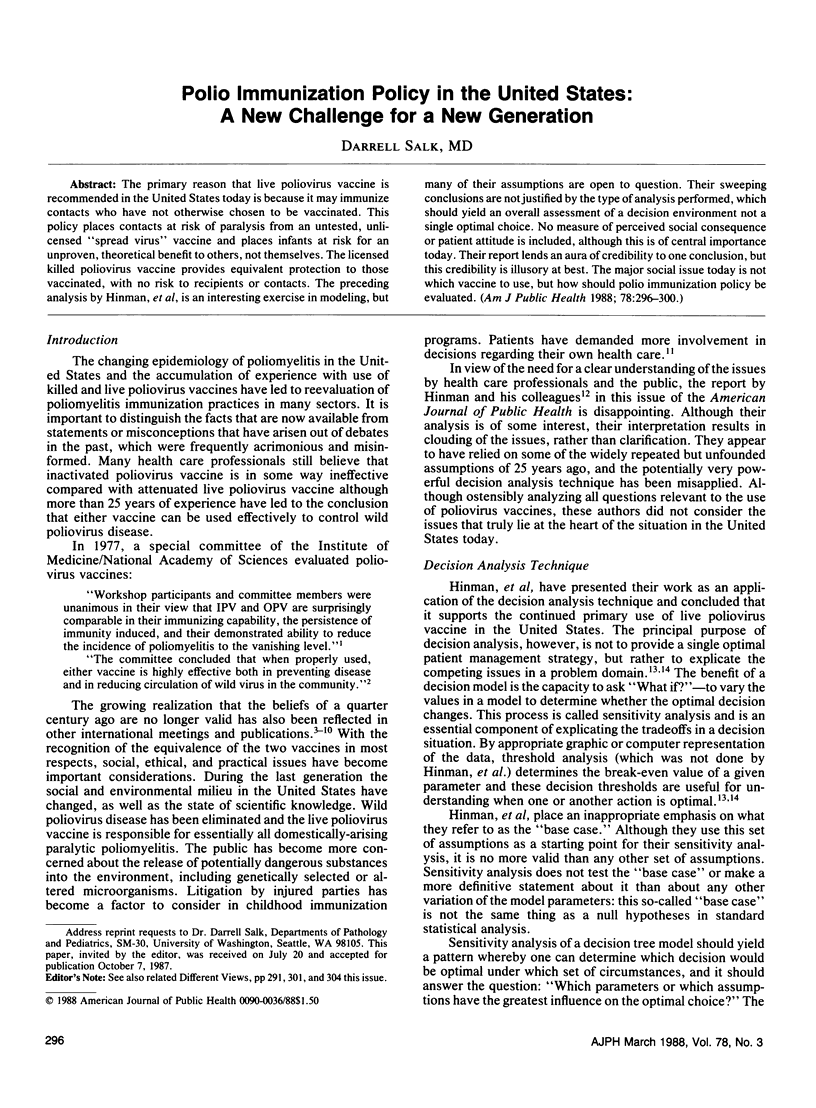
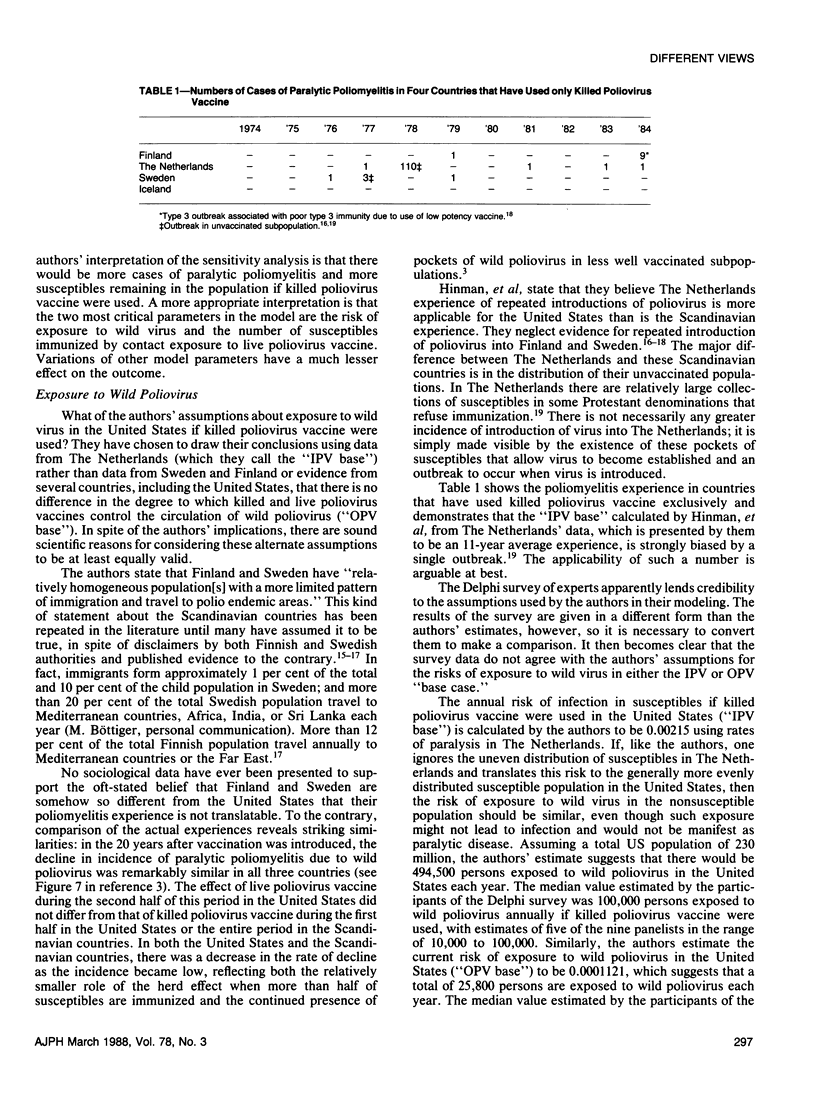
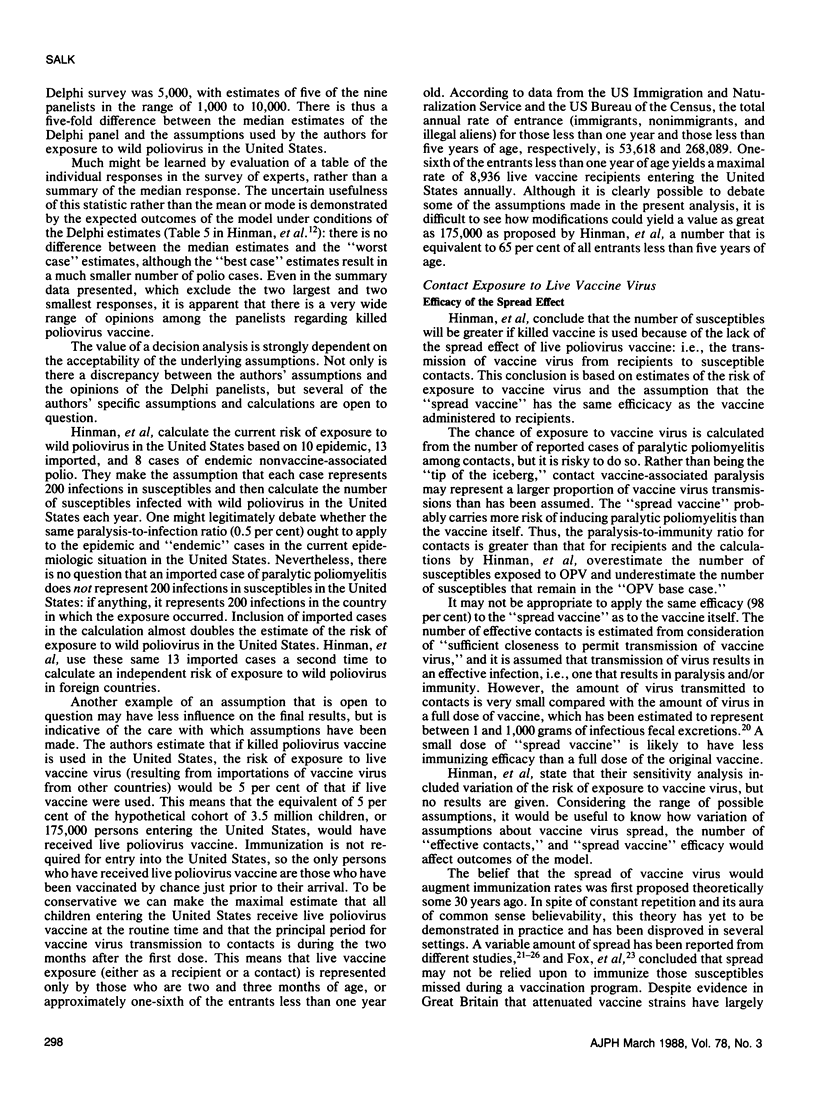
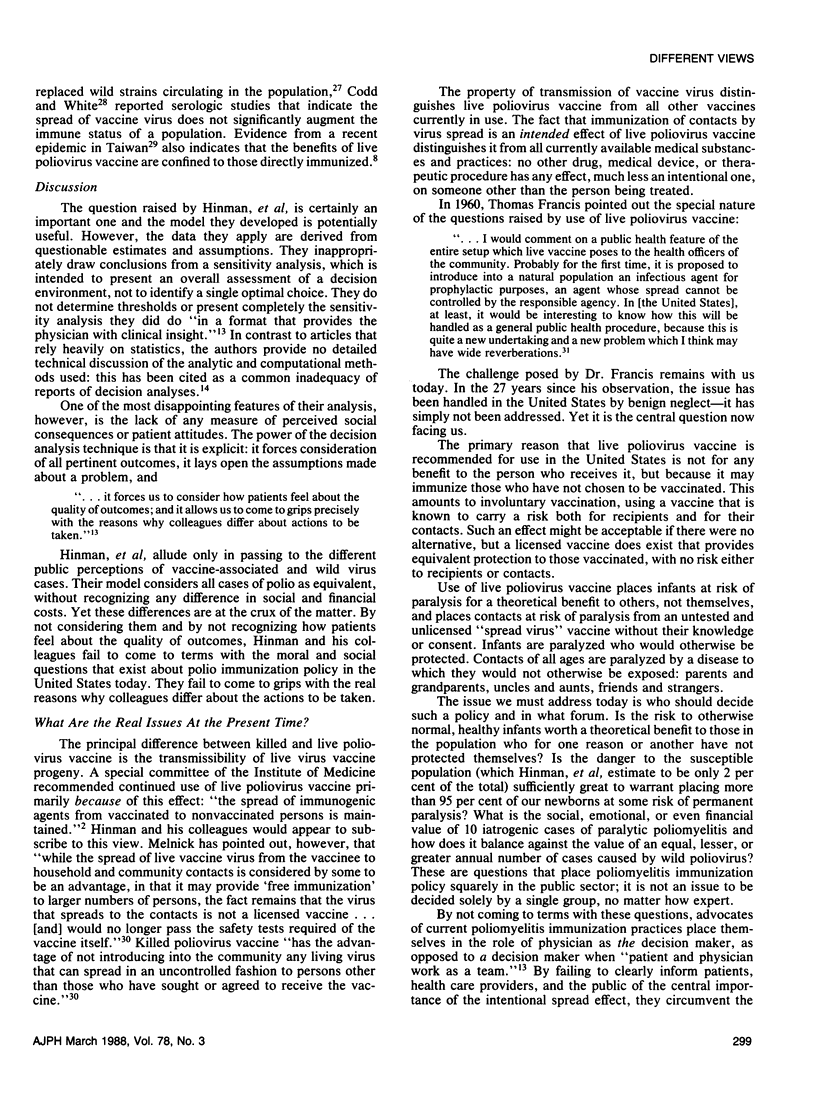
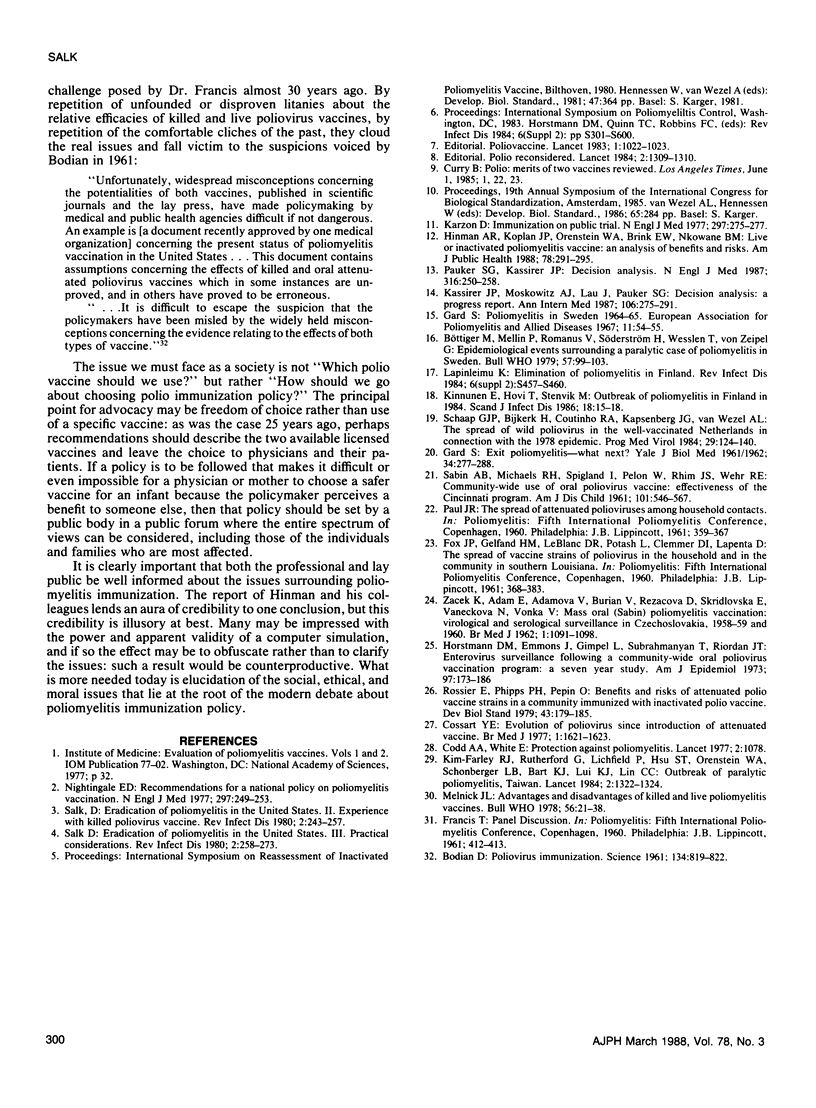
Selected References
These references are in PubMed. This may not be the complete list of references from this article.
- Bodian D. Poliomyelitis Immunization: Mass use of oral vaccine in the United States might prevent definitive evaluation of either vaccine. Science. 1961 Sep 22;134(3482):819–822. doi: 10.1126/science.134.3482.819. [DOI] [PubMed] [Google Scholar]
- Böttiger M., Mellin P., Romanus V., Söderström H., Wesslen T., von Zeipel G. Epidemiological events surrounding a paralytic case of poliomyelitis in Sweden. Bull World Health Organ. 1979;57(1):99–103. [PMC free article] [PubMed] [Google Scholar]
- Codd A. A., White E. Protection against poliomyelitis. Lancet. 1977 Nov 19;2(8047):1078–1078. doi: 10.1016/s0140-6736(77)91913-4. [DOI] [PubMed] [Google Scholar]
- Cossart Y. E. Evolution of poliovirus since introduction of attenuated vaccine. Br Med J. 1977 Jun 25;1(6077):1621–1623. doi: 10.1136/bmj.1.6077.1621. [DOI] [PMC free article] [PubMed] [Google Scholar]
- GARD S. Exit poliomyelitis--what next? Yale J Biol Med. 1961 Dec;34:277–288. [PMC free article] [PubMed] [Google Scholar]
- Hinman A. R., Koplan J. P., Orenstein W. A., Brink E. W., Nkowane B. M. Live or inactivated poliomyelitis vaccine: an analysis of benefits and risks. Am J Public Health. 1988 Mar;78(3):291–295. doi: 10.2105/ajph.78.3.291. [DOI] [PMC free article] [PubMed] [Google Scholar]
- Horstmann D. M., Emmons J., Gimpel L., Subrahmanyan T., Riordan J. T. Enterovirus surveillance following a community-wide oral poliovirus vaccination program: a seven-year study. Am J Epidemiol. 1973 Mar;97(3):173–186. doi: 10.1093/oxfordjournals.aje.a121498. [DOI] [PubMed] [Google Scholar]
- Karzon D. T. Immunization of public trial. N Engl J Med. 1977 Aug 4;297(5):275–277. doi: 10.1056/NEJM197708042970511. [DOI] [PubMed] [Google Scholar]
- Kassirer J. P., Moskowitz A. J., Lau J., Pauker S. G. Decision analysis: a progress report. Ann Intern Med. 1987 Feb;106(2):275–291. doi: 10.7326/0003-4819-106-2-275. [DOI] [PubMed] [Google Scholar]
- Kim-Farley R. J., Rutherford G., Lichfield P., Hsu S. T., Orenstein W. A., Schonberger L. B., Bart K. J., Lui K. J., Lin C. C. Outbreak of paralytic poliomyelitis, Taiwan. Lancet. 1984 Dec 8;2(8415):1322–1324. doi: 10.1016/s0140-6736(84)90831-6. [DOI] [PubMed] [Google Scholar]
- Kinnunen E., Hovi T., Stenvik M. Outbreak of poliomyelitis in Finland in 1984. Description of nine cases with persisting paralysis. Scand J Infect Dis. 1986;18(1):15–18. doi: 10.3109/00365548609032300. [DOI] [PubMed] [Google Scholar]
- Lapinleimu K. Elimination of poliomyelitis in Finland. Rev Infect Dis. 1984 May-Jun;6 (Suppl 2):S457–S460. doi: 10.1093/clinids/6.supplement_2.s457. [DOI] [PubMed] [Google Scholar]
- Melnick J. L. Advantages and disadvantages of killed and live poliomyelitis vaccines. Bull World Health Organ. 1978;56(1):21–38. [PMC free article] [PubMed] [Google Scholar]
- Nightingale E. O. Recommendations for a national policy on poliomyelitis vaccination. N Engl J Med. 1977 Aug 4;297(5):249–253. doi: 10.1056/NEJM197708042970505. [DOI] [PubMed] [Google Scholar]
- Pauker S. G., Kassirer J. P. Decision analysis. N Engl J Med. 1987 Jan 29;316(5):250–258. doi: 10.1056/NEJM198701293160505. [DOI] [PubMed] [Google Scholar]
- Rossier E., Phipps P. H., Pépin O. Benefits and risks of attenuated polio vaccine strains in a community immunized with inactivated polio vaccine. Dev Biol Stand. 1979;43:179–185. [PubMed] [Google Scholar]
- SABIN A. B., MICHAELS R. H., SPIGLAND I., PELON W., RHIM J. S., WEHR R. E. Community-wide use of oral poliovirus vaccine. Efectiveness of the Cincinnati program. Am J Dis Child. 1961 May;101:546–567. doi: 10.1001/archpedi.1961.04020060004002. [DOI] [PubMed] [Google Scholar]
- Salk D. Eradication of poliomyelitis in the United States. II. Experience with killed poliovirus vaccine. Rev Infect Dis. 1980 Mar-Apr;2(2):243–257. doi: 10.1093/clinids/2.2.243. [DOI] [PubMed] [Google Scholar]
- Salk D. Eradication of poliomyelitis in the United States. III. Poliovaccines--practical considerations. Rev Infect Dis. 1980 Mar-Apr;2(2):258–273. doi: 10.1093/clinids/2.2.258. [DOI] [PubMed] [Google Scholar]
- Schaap G. J., Bijkerk H., Coutinho R. A., Kapsenberg J. G., van Wezel A. L. The spread of wild poliovirus in the well-vaccinated Netherlands in connection with the 1978 epidemic. Prog Med Virol. 1984;29:124–140. [PubMed] [Google Scholar]
- ZACEK K., ADAM E., ADAMOVA V., BURIAN V., REZACOVA D., SKRIDLOVSKA E., VANECKOVA N., VONKA V. Mass oral (Sabin) poliomyelitis vaccination. Virological and serological surveillance in Czechoslovakia, 1958-9 and 1960. Br Med J. 1962 Apr 21;1(5285):1091–1098. doi: 10.1136/bmj.1.5285.1091. [DOI] [PMC free article] [PubMed] [Google Scholar]


